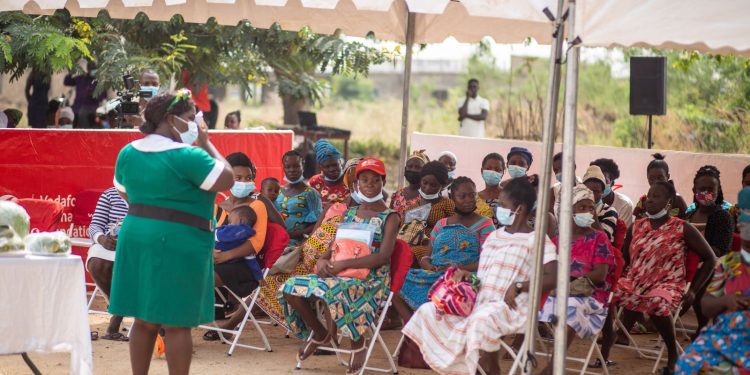In rural communities across Ghana, expectant mothers struggle to access affordable and convenient prenatal care, increasing the risk of maternal and newborn deaths. Dora Manwuro, a 29-year-old mother of three, knows this all too well.
Living in Amanase, a remote village in the Ayensuano District of the Eastern Region, Dora had been paying GHC30 for every ultrasound scan during her pregnancy and had to travel to Suhum or Asuboi for the service. Many expectant mothers across Ghana face similar healthcare challenges.
However, an initiative by the Vodafone Ghana Foundation has been changing the game since 2015. Through the Rural Ultrasound Scan Programme, pregnant women in remote villages across the country can access free mobile ultrasound services. To date, the programme has helped provide free ultrasound scans to over 20,000 pregnant women.
Dora became intrigued when she heard through her community’s information centre that the programme would provide free ultrasound scan services for pregnant women in her community, and she decided to take part.
Her decision turned out to be well-timed. “When I got to the health centre, I was registered and given a sheet and number,” Dora said. “The midwives gave education on the four-star diets. I was then ushered into the scan room where I had my scan done. I saw my baby, and the report was given to me. We were also given snacks.”
However, just minutes after receiving her scan, Dora began experiencing cramps in her abdomen. The midwives who were present quickly assessed her and said labour had started. They rushed her to the ward where, shortly after, she gave birth to a bouncing baby boy.
“It was like a miracle to me,” Dora says. “If not for the scan programme, I would have had to pay for transportation to the clinic, and I may have arrived late because my husband was not around.”
“They gave me all the necessary support during the programme, and I heard this was the first time this has happened during a scan service by Vodafone,” she said happily.
This initiative is also in line with Vodafone Ghana’s “Inclusion for All” purpose pillar, which aims to make the benefits of digital society accessible to all. The provision of free ultrasounds is a step towards addressing the needs of pregnant, underserved women while harnessing the power of portable, life-saving technology.
Patricia Obo-Nai, CEO of Vodafone Ghana, emphasised the importance of partnerships in accelerating access to digital healthcare in Ghana, saying, “We believe that no woman should die during childbirth, and we are committed to leveraging technology to reduce maternal and neonatal mortality rates in Ghana.”
For Dora, the Rural Ultrasound Scan programme has had a significant impact on her life, and she recommends it to all pregnant women. “The services are free, and the staff are friendly as well,” she said. “You get answers to all your questions and get snacks after the programme.”
With initiatives like the Rural Ultrasound Scan programme, Vodafone Ghana is taking important steps to address the healthcare challenges facing underserved communities in Ghana and ensure that no mother or child is left behind.






